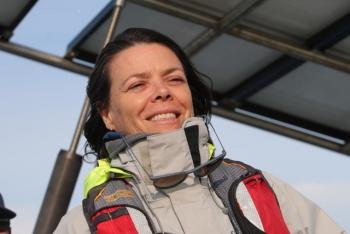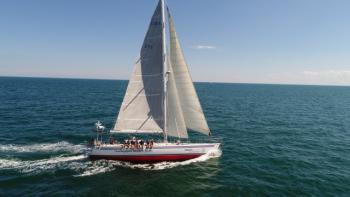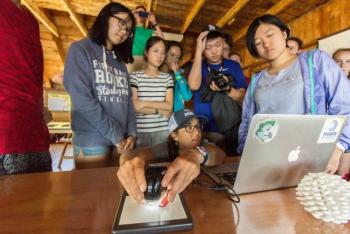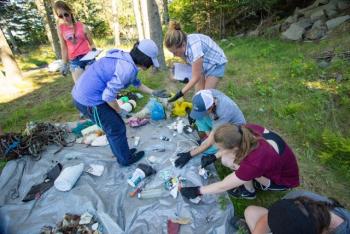The Rozalia Project for a Clean Ocean, at Camden Rotary Club
Two years ago, Camden Rotarians volunteering at the Hurricane Island Science and Leadership Center encountered an impressive sight: a stretch of beach covered with carefully sorted marine debris collected by the Rozalia Project for a Clean Ocean.
The nine-member crew of American Promise, the Rozalia Project’s 60-foot sailboat and research vessel, had stopped there as part of the organization’s ongoing efforts to collect marine debris, amass data about it, and find solutions that promote a clean, protected, and thriving ocean.
Rozalia Project Executive Director Ashley Sullivan met with the club recently to explain the organization’s approach to the longstanding problem of marine debris in both urban and coastal waters.
“We focus on prevention, cleanup, education, and solutions-based research,” Sullivan said. “With marine debris, there is no silver bullet, but we are extremely enthusiastic and optimistic about the future. The collective ‘we’ created this problem, and we believe the collective ‘we’ can solve it. But to achieve this, we need to make changes in our everyday lives.”
In addition to conducting research to aid the ongoing study of such issues as the presence of microplastics and microfibers, which are present everywhere from deep ocean water to the open air, the Rozalia Project runs educational programs for people of all ages and backgrounds.
These programs start with cleaning up shorelines in the Gulf of Maine, often on islands in Penobscot Bay. Participants help sail the boat, gather refuse, and sort it into categories such as derelict fishing gear, microplastics, and consumer products. Sullivan noted that the last type is by far the most problematic: Items we use on land account for 80 percent of marine debris. Global data sets put plastic bottles, cigarette butts, and food wrappers at the top of the list.
“You can’t go through this experience without having an ‘aha’ moment when you’re cleaning up a beautiful beach and collect something you use every day,” Sullivan said. “That gives us a starting point for challenging people to identify problems that trouble them and seek ways to solve them. We embolden students to seek solutions to problems that are screaming at them. Once they determine what they want to tackle, they dig into finding ways to solve it. The end of the workshop includes a pitch presentation to their peers or community answering these five questions: 1) What is the problem you are trying to solve? 2) Why is it important? 3) What is your idea? 4) Why is it awesome? 5) What do you need to make it happen?
The Rozalia Project sought a solution of its own to the problem of microfiber pollution: the invention of a device that captures microfibers from garments in washing machines. “The Cora Ball is a solution to this problem but also a tool that brings needed attention to microfiber pollution in our public waterways and demonstrates that we are capable of solving the problem of marine debris both upstream and downstream of the issue.,” said Sullivan. “All of us can impact the problem of marine debris. Start with one behavior change you can make for healthier oceans. It starts with YOU. For more information, please contact us at info@rozaliaproject.org.”
The Camden Rotary Club serves the community through volunteerism, grants to local nonprofit organizations, and academic scholarships. Visitors are welcome to attend the club’s Tuesday noontime meetings on Zoom. Contact Stephanie French at steph.griffinsg00@gmail.comfor access.





























